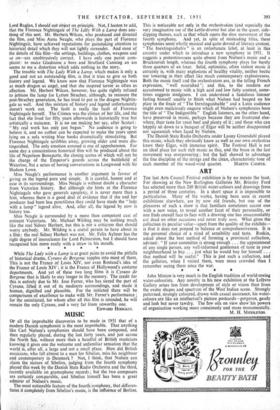MUSIC
OF all the improbable discoveries to be made in 1951 that of a modern Danish symphonist is the most improbable. That anything like Carl Nielsen's symphonies should have been composed, and then regularly played, during thOast forty years, and just across the North Sea, without more than a handful of British musicians knowing it gives one the welcome and unfamiliar sensation that the world is, after all, a large and not a small place. How did British musicians, who fell almost to a man for Sibelius, miss his neighbour and contemporary in Denmark ? Not, I think, that Nielsen can claim the stature of Sibelius, judging from the fourth symphony played this week by the Danish State Radio Orchestra and the third, recently available on gramophone records ; but the two composers are certainly comparable, and Sibelius himself has been a great admirer of Nielsen's music.
The most noticeable feature of the fourth symphony, that differen- tiates it completely from Sibelius's music, is the influence of Berlioz. This is noticeable not only in the orcheStration (and especially the very imaginative use of the kettle-drums) but also in the queer, side- slipping themes, such as that which opens the slow movement of the fourth symphony. And yet, in spite of misleading titles, these symphonies seem wholly musical and quite devoid of literary content. "The Inextinguishable" is an unfortunate label, at least in this country under which to introduce a new symphony in 1951. It suggests a pretentiousness quite absent from Nielsen's music and a Brucknerish length, whereas the fourth symphony plays for barely three quarters of an hour. Solid, optimistic, often violent music it certainly is, with many explosions of healthy vitality, neither hectic nor lowering in their effect like much contemporary explosiveness. Both the music itself and the orchestration are, in the telling French expression, "well nourished "; and this, to the modern ear accustomed to music with a high acid and low fatty content, some- times suggests stodginess. I can understand a fastidious listener feeling himself unable to finish what Nielsen had heaped on his plate in the finale of "The Inextinguishable" and a Latin audience might even maliciously enquire which of Nielsen's symphonies bore the title of "The Indigestible." English listeners, on the other hand, have preserved in music, perhaps because they are frustrated else- where, their taste for roast beef and plenty of it ; and those who can hapbily sit down to a banquet of Elgar will be neither disappointed nor squeamish when faced by Nielsen.
The Danish State Radio Orchestra under Launy Groendahl played this music, which they obviously know as well as our own orchestras know their Elgar, with immense spirit. The Festival Hall is not an ideal place for such rich music as this, and the brass in the last movement was overpowering ; but the hall showed to advantage the fine discipline of the strings and the clean, characteristic tone of each member of the wood-wind quartet. MARTIN COOPER.


































 Previous page
Previous page